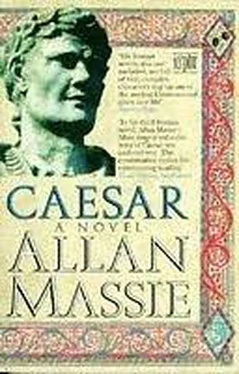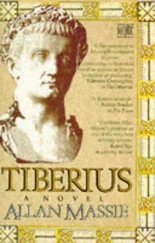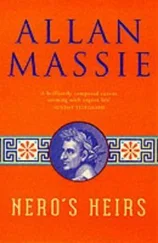Allan Massie - Caesar
Здесь есть возможность читать онлайн «Allan Massie - Caesar» весь текст электронной книги совершенно бесплатно (целиком полную версию без сокращений). В некоторых случаях можно слушать аудио, скачать через торрент в формате fb2 и присутствует краткое содержание. Жанр: Исторические приключения, на английском языке. Описание произведения, (предисловие) а так же отзывы посетителей доступны на портале библиотеки ЛибКат.
- Название:Caesar
- Автор:
- Жанр:
- Год:неизвестен
- ISBN:нет данных
- Рейтинг книги:3 / 5. Голосов: 1
-
Избранное:Добавить в избранное
- Отзывы:
-
Ваша оценка:
- 60
- 1
- 2
- 3
- 4
- 5
Caesar: краткое содержание, описание и аннотация
Предлагаем к чтению аннотацию, описание, краткое содержание или предисловие (зависит от того, что написал сам автор книги «Caesar»). Если вы не нашли необходимую информацию о книге — напишите в комментариях, мы постараемся отыскать её.
Caesar — читать онлайн бесплатно полную книгу (весь текст) целиком
Ниже представлен текст книги, разбитый по страницам. Система сохранения места последней прочитанной страницы, позволяет с удобством читать онлайн бесплатно книгу «Caesar», без необходимости каждый раз заново искать на чём Вы остановились. Поставьте закладку, и сможете в любой момент перейти на страницу, на которой закончили чтение.
Интервал:
Закладка:
He did not remain long, being uncertain, I suppose, how things would turn out, and reluctant to be too closely associated with the consequences of an act in which he had had no share.
Other sympathisers made equally brief appearances, nervous, divided between elation and terror.
Casca yawned, and sent a slave in search of wine.
"What do we do now, eh?" he said. "Buggered if I know," he added.
I was dizzy from my wound, unable to think clearly. Two ravens rose from the roof of the Temple of Jupiter and flapped their slow way towards the Tiber.
Dolabella appeared arrayed in the insignia of the consulship which in other circumstances he would only have assumed when Caesar departed for the Balkans. He, too, neither knew what to say nor whether he should be with us.
"Have you seen Antony? Where is he? Does anyone know what has become of him?"
Below us in the Forum the crowd was thickening. A confused babble rose to our ears. I searched for a note of rejoicing.
I said to Cassius:
"We are in danger of losing our advantage. This is our hour and we must act on it. We can't sit here and admire our handiwork."
It was agreed that Markie should address them. The proposal disconcerted him.
"Why me? It was not my idea. Perhaps Cassius…?"
"Listen," I said. "You are the man they want to hear. It was you who received all those pleas urging you to be worthy of our ancestor. Well, show us that you are. Cassius may have been our leader. Without him we wouldn't have got where we are. But you, cousin, are the man with the spotless reputation. So, get on with it, or I swear I'll mingle your blood with Caesar's on my dagger."
Vanity and fear are the two great motivating forces. They snapped at Markie's heels as he descended to the Forum.
A cheer broke out. He approached the rostrum amidst cries of "Noble Brutus" and suchlike nonsense; encouraging in the circumstances, of course.
He raised his hand for silence. The murmuring died away. Someone shouted, "Let's hear Brutus… let's hear what the noble Brutus has to say."
He began to speak. He spoke well, I have to admit that. It is a strange gift, oratory, and one you wouldn't have expected Markie to possess. Of course he wasn't in Cicero's class — there was no music in his voice — and he didn't have even Antony's wild eloquence, but he was effective. If you didn't know him — and of course the mob knew his reputation, not the man himself — you would have said: "This is an honest man. I can rely on him to speak the truth." So close is oratory to acting.
"Friends," he said, "fellow citizens. This is a day of sun and rain, a day to weep, and a day to rejoice. Hear me out, I urge you, before you pass judgment on what we have done this morning. There are many here who loved Caesar. I count myself among them…"
He was well-launched. I turned my attention to the crowd. There was a fellow just below me, a big, black-stubbled, sweaty fellow with the look of a butcher, his wrists bloodstained, whose chest heaved with sobs. He tore a dirty rag from around his neck and mopped his eyes. When Markie paused, he raised his head and emitted a bellow of pain, rage, grief, I know not what. A companion passed him a flask. He took a swig and a rivulet of yellow wine ran from the corner of his mouth to his chin. He pursued it with his tongue and then wiped his chin with the rag, and drank again.
Markie drew his dagger, and waved it above his head.
"This knife which slew Caesar is ready to be employed against my own person, should the good of Rome require me to die."
Perhaps my threat had inspired this dramatic stroke? The crowd roared, madly, contemptibly. Markie was the hero of the moment, stern, just, noble, selfless, everything he would wish to be taken for. I could not but reflect that the same mob would have cheered as loudly to see us strung up, naked, by the heels.
Cinna, never bright, responded to what he thought to be the mood of the crowd.
"Caesar was a bloody tyrant," he yelled, "and don't any of you forget it."
A clod of dung struck him in the face. Other missiles followed, and we withdrew in disorder back to the Capitol.
Antony had not been idle. When he recovered from his initial moment of terror — quite understandable in my opinion and justified, of course, if I had had my way — and realised that his life was not in immediate danger, he had hastened to Caesar's house. He found Calpurnia in paroxysms of grief, or perhaps fury. He wasted little time in comforting her, the task being as vain as it was unnecessary. Calpurnia was of no importance now. He had never liked her and knew her to be a bitch who would soon find some other man to torment. That poor wretch's state would be worse than Caesar's for he would have to endure comparisons with the dead hero. So Antony brushed her aside and took possession of all Caesar's papers, acting in his capacity as consul. Even Calpurnia couldn't argue with that, though I imagine she tried to do so.
He summoned a conference of Balbus the banker, Hirtius who was not only Caesar's secretary but consul-designate for the next year, and Lepidus, the Master of the Horse. So he secured to himself money, respectability — nobody being more respectable than Hirtius, who was never shocked, Caesar used to aver, by a dirty joke, because he was too virtuous to see it — and, of the greatest immediate importance, soldiers, since Lepidus commanded the only troops in the immediate vicinity of Rome. Then he sent a message to us, proposing an "armistice" and a peace conference. To show his confidence in our virtue, he entrusted the message to his eighteen-year-old son.
You had to grant Antony nerve. I compared his energy and confidence with the pusillanimity of my confederates.
I spent that evening writing letters: to Longina, Octavius and Cicero. You can imagine with what eloquence I argued our case. But I was well aware that I might be dead before darkness fell again.
I was awakened with the news that Lepidus had stationed three cohorts in the Forum and had reinforced the guards at the city gate. Rome, which we had liberated, was now our prison, if we failed to reach an agreement with Caesar's heirs. Lepidus had the good manners or political sense to send me a note explaining that his only desire was to secure order and prevent riots. He sent a similar note to Markie who found no difficulty in believing him.
Then, before I was dressed, another note arrived, this time from Antony himself. Its tone was friendly, but I discounted that, for obvious reasons. He had summoned the Senate to meet the following day at the Temple of Tellus: "It is necessary that things be arranged in an orderly and legal manner." The word "legal" was underlined, twice, with bold strokes. He invited Cassius and me to dine with him that evening, adding that Lepidus was issuing a similar invitation to Markie and Metellus Cimber. There was a footnote: "Don't be alarmed by the measures Lepidus has taken. I would have prevented them if I had known his intentions, but the poor fool must play the Great Man. You know what he is like, Mouse."
I armed the slaves escorting me to Antony's house with truncheons. There had been disturbances in the city. A poet, unhappily named Cinna, had been mistaken for our confederate and bludgeoned to death in an alley. He was, I was later told, a very indifferent poet, but his lame verses scarcely excused his murder.
Antony was sober, but called for wine as soon as I was announced, and drank a beaker before he entered on conversation.
"I hadn't taken you for such a fool, Mouse." "I understood from the tone of your letter that there were to be no recriminations, this evening at least." "Granted."
"Besides, I gave you sufficient indication. I all but openly invited you to join us." "Granted again."
"Have you heard what Cicero is saying?" "Could I be interested?"
Читать дальшеИнтервал:
Закладка:
Похожие книги на «Caesar»
Представляем Вашему вниманию похожие книги на «Caesar» списком для выбора. Мы отобрали схожую по названию и смыслу литературу в надежде предоставить читателям больше вариантов отыскать новые, интересные, ещё непрочитанные произведения.
Обсуждение, отзывы о книге «Caesar» и просто собственные мнения читателей. Оставьте ваши комментарии, напишите, что Вы думаете о произведении, его смысле или главных героях. Укажите что конкретно понравилось, а что нет, и почему Вы так считаете.












